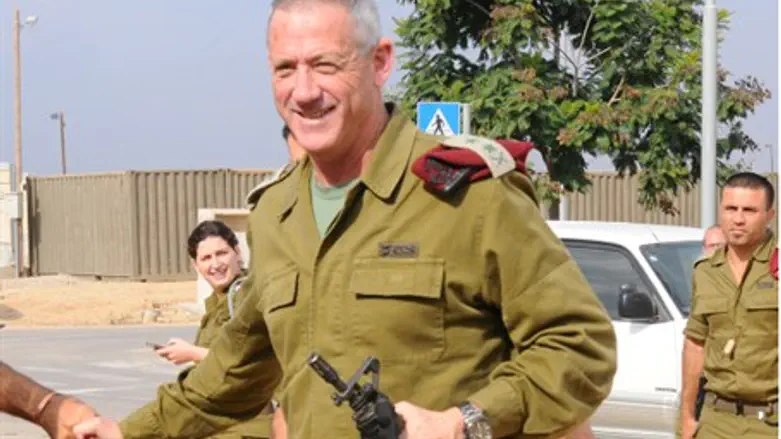
Chief of Staff Benny Gantz on Friday visited Israelis who had been hurt by recent Gaza rocket attacks and were hospitalized at the Soroka Hospital in Be’er Sheva.
During the visit, Gantz said that "the desired results in the Gaza operation were achieved." He added that "with every passing day the other side will understand what really happened to it.”
"We do not need to be alarmed and be frustrated by all sorts of demonstrations in different places," he said, stressing that he assumes “that the results will speak for themselves."
Gantz said that during Operation Pillar of Defense, Israel “acted in a planned and controlled manner, and right now we are also working to ensure that the security in the south will improve - just as we intended to do."
The Chief of Staff went on to praise the IDF and the strength of the Israeli home front during the recent escalation. "The IDF is a strong army and the public is also strong," he said.
Israel’s leaders, particularly Prime Minister Binyamin Netanyahu, have been criticized over the ceasefire with Hamas that ended the Pillar of Defense counter-terror operation.
“The bottom line is, not only did the government and the IDF not deter Hamas, Hamas deterred the government,” said attorney Yoram Sheftel in his weekly column for Arutz Sheva.
“Terrorist organizations have no concept of ‘deterrence’ until they are wiped out,” he added. “That is how it was in the Defensive Shield operation when we destroyed Hamas in Judea and Samaria.”
“Hamas is going to continue to arm itself and the situation will only get worse,” he concluded. “They will arm themselves with tens of thousands of rockets and they will decide when to fire on Israel.”
Responding to the criticism, Foreign Minister Avigdor Lieberman said on Thursday, "I am proud that we have a leadership that can make decisions even when they are contrary to its electoral interests.”
"It is obvious that a majority of the population was in favor of continuing the operation," Lieberman added, “but power is not only about hitting but also about holding back."
Defense Minister Ehud Barak, who was asked on Thursday about the public's disappointment with the way the operation ended, said that it is the government and not the public that must make such decisions. "I remember situations in which 80% of the Israeli public supported a certain decision, and ten days later it turned out to be a very big failure," he added.
Defending the decision to stop the operation, he said: "The leadership has the appropriate tools. It is still not time to enter Gaza in a very wide operation and conquer it."
Barak said no one expected Hamas to "go down on its knees," and no one expected it to disappear in an operation that did not include the IDF entering Gaza. "Whoever dreams at night about the beach of Gaza and the alleys of Beit Lahiya has the right to do so," he added. "I do not miss these places. Only bringing Israeli rule back to Gaza will topple Hamas rule, but I am not sure that this would be wise."
Post-ceasefire violence continued on Friday with a violent clash along the Gaza security fence. Gaza residents said one local man was killed by IDF fire and several others were wounded.
The IDF Spokesperson later indicated that the soldiers had to fire into the air because Gazans had caused a disturbance along the security fence.
Hamas blamed Israel for the incident and claimed that it had violated the ceasefire. “We’ll be sure to update the Egyptians about the latest escalation,” said Hamas spokesman Sami Abu-Zuhri.
(Arutz Sheva’s North American Desk is keeping you updated until the start of Shabbat in New York. The time posted automatically on all Arutz Sheva articles, however, is Israeli time.)